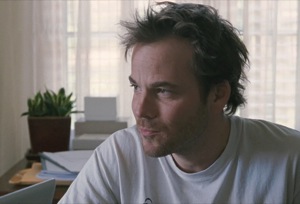
Written and Directed by Sofia Coppola
Starring Stephen Dorff and Elle Fanning
At the Landmark Hillcrest Cinema
Rated R
by Ted Gideonse
Somewhere, Sofia Coppola’s quiet cinematic poem about Holly-wood ennui has one particularly gay moment. Movie star Johnny Marco, played by Stephen Dorff, has a regular masseuse, but when she is unavailable a masseur is instead sent to Johnny’s suite at the Chateau Marmont. But when Ron, the masseur, undresses completely as he prepares for the massage, Johnny leaps up from the table and says, “What the fuck, dude?” Ron explains, “If my client is naked, it’s more comfortable if I meet him on the same level.” Johnny laughs nervously and says, “That’s not for me… Thanks, though. Just pack it up.” While the masseur gets dressed, Johnny starts drinking a beer, and the masseur says, “Sorry about that.” Johnny, already back in his amenable, almost dulled, resting state that he stays in for most of the film, says, “No, it’s cool.” And he takes a sip of his beer and looks at the floor.
While Somewhere is Coppola’s third movie in a row set in a hotel (after Oscar-winners Lost in Translation, set at the Park Hyatt Tokyo, and Marie Antoinette, set at Versailles, which is a hotel of a sort, as other critics have pointed out), it is her first film revolving around an almost completely passive protagonist. Johnny is surrounded by easy women, room service, and occasionally, his daughter Cleo, an emotionally aware, slightly precocious 11-year-old played by the nearly translucently fair Elle Fanning. Johnny must have been ambitious at some point; he is a major movie star now, and that doesn’t happen by accident. But the Johnny in Somewhere only reacts. He goes where his publicist tells him to go, smiling and willingly, and never complains about coming home to strangers partying in his room or having to sit for an hour at a special effects studio with his head enveloped in molding clay.

Why is Johnny sad? Why is he so bored? We don’t know. Coppola seems to have assumed we all know that fame and money can lead to sadness. The sad star is as iconic as the hooker with the heart of gold or the cop with a drinking problem. But not all sad stars are the same. Johnny is the art house version of Britney Spears’ Lucky. Yes, he’s a star, and he cries, cries, cries in his lonely heart, but his sadness is not the plastic vapidity of a pop song. Instead, it’s telegraphed through Coppola’s long, almost silent shots in which all he’s doing is sitting on a couch, sighing, or smoking a cigarette and wanly looking at the night lights of Los Angeles. Dorff, who is known for one great performance – as transsexual Candy Darling in I Shot Andy Warhol– and vaguely remembered in a couple of dozen forgettable roles in C-list movies like City of Industry, is expressively handsome. His smile is bright, his hair is messy, and he looks great with a permanent five o’clock shadow and standing around in only a towel. But Coppola shows the somewhat sad reality, too. A box of Propecia sits on Johnny’s sink, and he has to stand on a wooden box when he’s photographed next to his female co-star. Johnny, and Dorff, is shorter than Tom Cruise.

While Johnny’s weariness is unexplained, we know exactly what does make him happy: Chloe. Each time she arrives at his door, Johnny’s smile is authentic, different from the one he puts on for reporters and the starlets who throw themselves at him. His love for Chloe, and the scenes of the simplistic fun they have together eating gelato in bed, or miming an underwater tea party in a pool, communicate a pure sweetness missing from Johnny’s life when Chloe is not there. The relationship between Johnny and Chloe is not quite magical, but it is beautiful, and the half of the movie in which they are together makes clear Coppola’s point, which is clichéd but always welcome: money doesn’t make you rich, love does.
Somewhere will infuriate some people. It is not as funny as Lost in Translation or as opulent as Marie Antoinette (which some people loathed), and it is obvious in its message and its tropes. It’s slow, and it’s ponderous, and I’m sure that in these economic times, few viewers will have much empathy for someone sad about being filthy rich and world famous. Others, like the judges at the Venice Film Festival who awarded Somewhere a Golden Lion, will find the stark, leisurely beauty of the film entrancing.










